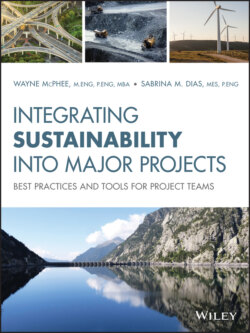Читать книгу Integrating Sustainability Into Major Projects - Wayne McPhee - Страница 26
Understanding Community Support
ОглавлениеHistorically, formal approval for major projects meant convincing government regulators that the project was in the best interest of the government. As local communities and stakeholders gain more influence, it is becoming essential for projects to demonstrate that they have the support of the local community and can maintain that support to successfully deliver the project.
There are a number of different terms that are used to capture this idea of establishing stakeholder support. Depending on your organization or industry you may need to use one or all of these terms, including:
Social capital
Good will
Public support
Community support
Social license to operate (SLO)
“Social license to operate” implies that there is an actual license or signed document to demonstrate the project has required support to move forward, but there is no such formal license. SLO is simply shorthand to indicate that there is a positive relationship with the local community and that they support the project, at least at the present time. “Securing an SLO” essentially means earning the trust of the project's local communities and building strong, mutually respectful relationships with them. It is important to understand that SLO is not a legal document and that stakeholders can “revoke” their project support (i.e. the SLO) at any time and without notice.
Social capital and good will are terms that suggest that you can place an economic value on relationships with stakeholders and local communities. Good will can be used in a social context to mean that a person is trusted. In the accounting context it is used to represent the intangible assets that an organization has, such as brand value, reputation, and intellectual property.
In the context of a major project, social capital and good will relate to the value that exists in the strength of the relationships with the local community, which can be leveraged to help make the project a success. Strong relationships mean a high level of mutual respect and trust and much of this value is based on how the local community perceives the project and how they feel they are being treated by the project team.
Having a high level of social capital helps projects in many ways, including fewer project delays due to community disputes, faster permitting, and a more engaged local work force. Social capital provides value if there is a problem or an unforeseen environmental or social incident. With strong social capital, the project will be able to address the problem with limited negative backlash and perhaps local support to resolve issues faster.
